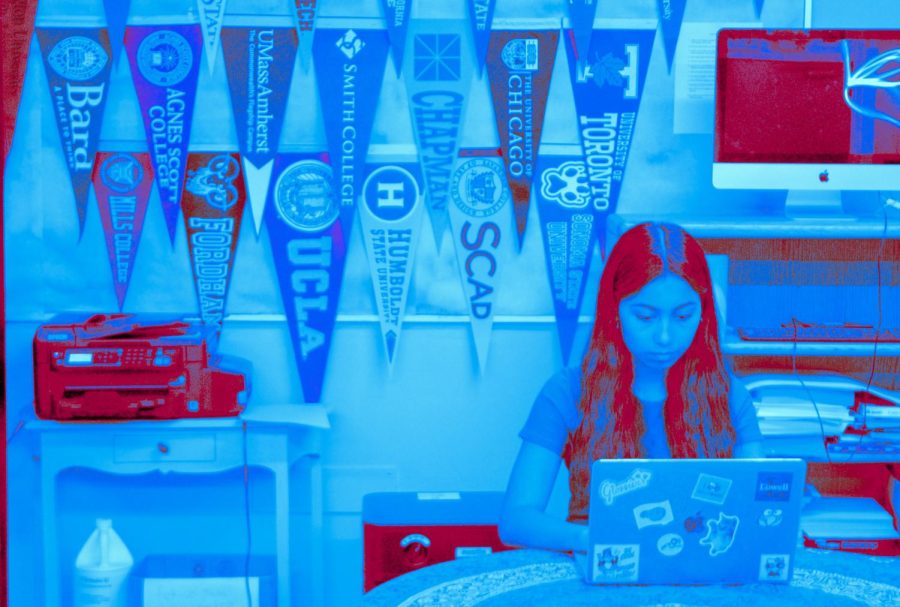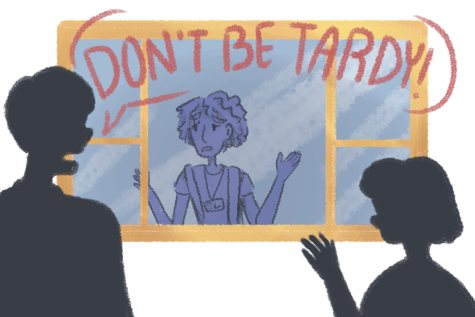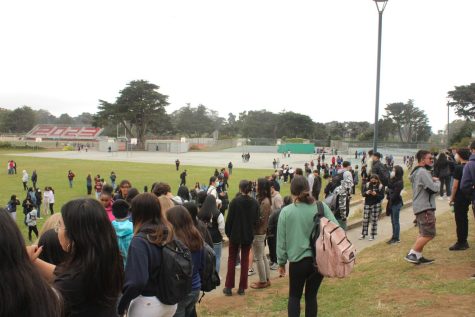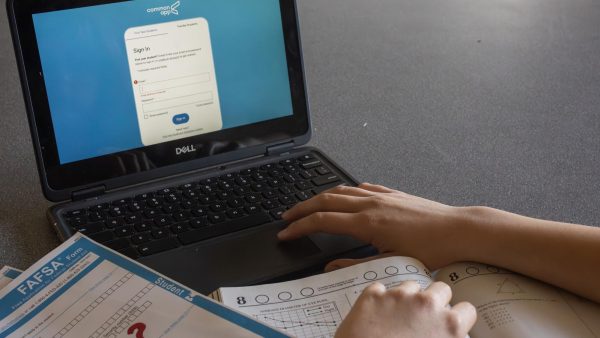First in their family, last in line
First generation students struggle to get enough support from Lowell in the college application process.
“What the f*ck,” senior Favio Nogales said as she opened the University of California application. She had been excited to get started on the process that would lead her to become the first in her family to go to college. Nogales gazed at the blue and gold background on the online application, not knowing how to navigate the site. The words seemed to grow fuzzy and incomprehensible. Dozens of questions swirled around her head as she felt alone, staring at her laptop screen. What is my family’s income? How do I get my transcript? How do I answer the essay questions? Where do I even start? She turned to her friends who aren’t first-generation, and was stunned to learn that they had private college counselors, were involved in numerous programs, and had family members to help. Nogales wondered why Lowell didn’t have enough resources to help a first-generation student, and decided to brave the application alone.

First-generation Lowellites are struggling with the college application process and feel Lowell isn’t doing enough to support them. This is in part due to shortages in staff and resources on campus. With college application season upon the Class of 2023, seniors have been rushing to get help with their college lists, essays, and financial aid applications. This onslaught of students seeking guidance has quickly overwhelmed Lowell’s college center, leaving first-generation students with little means of receiving the support they need. Moreover, Lowell students feel that Plan Ahead, Lowell’s replacement of the College and Career course, puts students at a disadvantage. As seniors start the application process, they’ve realized the program poorly introduced them to the process, with them being unable to recall any information they learned. Though Lowell does offer AVID (Advancement Via Individual Determination), the program’s accessibility isn’t as widespread for all first-gen students, with some even being unaware of the program.
Nogales, the eldest child of two Immigrant parents from Mexico, began at Lowell with no intention of going to college. However, after realizing in her junior year that she wanted to study abroad, college soon became a goal. Yet she had no idea how to achieve that goal. “I knew I wanted to go to college, but I had no clue how to get there, and I was failing my classes,” Nogales said. Upon meeting with her counselor, she found out that the only resource available was Lowell’s College Center, which was always packed. Thus, Nogales waited until her senior year to get help, anxiously attempting to do research, but coming up empty-handed when navigating the process.
Among Lowell’s small population of first-generation college applicants, Nogales is not alone in feeling this way. An anonymous survey given to five random senior registries showed that around 16 percent of the Class of 2023 are first generation, meaning they will be the first in their family to attend college. According to responses from the survey, these students have found the application process confusing and overwhelming. “It’s hard not knowing what I need to get done, and hard getting help because I don’t know what expectations I need to follow for my applications or what I can be doing to make it easier for myself,” an anonymous first-generation student said. Other first-generation students believe they need more guidance in the college application process. “It’s difficult getting any support to help me complete my essays or applying, because my parents have never gone through this process before,” another student said.
Lowell’s Vicci Center, otherwise known as the College and Career Center is often overflowing with stressed students working on applications and seeking out help. The center is open to all students to learn more about their options after graduating. The Vicci Center has been led by Lowell’s only college counselor, Maria Aguirre, for the past five years. While the center is accessible to everyone, Lowell’s massive student population and class of around 700 seniors restricts students from getting help every day. “The center has become very busy, with students popping in whenever they can to ask questions,” she said. During the fall semester, Aguirre has her schedule jam packed with seniors ready to hand over their essays, create college lists, and determine the college that’s best for them. However, Aguirre is only one person. “I’m so glad more students are coming to me for help, building those relationships early, but it can be overwhelming sometimes,” she said.
As a first-generation student herself, Aguirre knows the challenges they face, and wants to help as much as she can. “I think sometimes, one of the most challenging things is Lowellites are really so busy, and the deadlines are coming, so start as early as you can,” she said. Nonetheless, she still provides aid whenever she can for first-generation students, offering workshops to help families fill out FAFSA forms, as well as workshops for personal statements..
Lowell also offers AVID, a program that aims to close the opportunity gap for students and help them succeed in their classes. The course helps students build skills for the future, including resume writing, note taking, and mock interviews. For seniors, the AVID course called “Senior Seminar” offers in-class time to work on personal statements, plan field trips to colleges, and motivate seniors to have a comprehensive list of schools. Led by algebra teacher Ian Knight, students have more access to resources at Lowell, and are given guidance from Knight and other AVID teachers. “The great thing about AVID is that seniors have more resources; they meet with their counselors more often,” Knight said. “Ms. Wilson comes and meets with students once a grading period, and we provide college tour field trips.” Tilahni Hunkin, a first-generation senior, joined the class this year and appreciated the in-class time to work on applications. “The class has helped me reflect on myself and what I should be writing,” Hunkin said.
Though AVID is open to all students, many don’t use this resource because they are either unaware of the program or are unmotivated to join after their freshman year. To join, students must undergo an interview and fill out a questionnaire that gauges their academic goals. Teachers then determine who wants to become a better student. “The evaluation of students determines who joins because they want to improve, and who joins because their parents want them to,” Knight said. This process is complicated for students, especially those who don’t immediately join as a freshman. During the summer before freshman year, AVID sends out brochures to prospective students, inviting them to join. To those who didn’t receive a brochure, they must ask their counselor to be added to the class. “When I received my brochure, I thought AVID was just to help students take better notes and become more organized,” Nogales said. “I would’ve joined AVID if I knew they helped with college during my junior year. But after freshman year, you never hear from them unless you joined originally.”

Lowell’s introduction to college begins in freshman year, with Plan Ahead. Plan Ahead is a program that replaces the traditionally offered College and Career class offered at most high schools. Freshman-year teachers are required to integrate assignments that help students prepare for their future into their existing curriculum; Plan Ahead is not a separate class. Students are assigned to write resumes, calculate taxes, and complete a special project for their VPA or language class. Along with these lessons, freshmen are given a packet with required tasks, such as attending a college visit to take notes, research their desired major, and attend a career fair. All assignments and packets are due by the end of the winter semester, and if it is incomplete, students have to take a semester of College and Career in their Sophomore year. Though College and Career is offered, students can not sign up to take it, only those who don’t complete Plan Ahead are enrolled in the class.
Seniors Tilahni Hunkin and Isaak Tejada agree that Plan Ahead was highly ineffective for them. For Tejada, Plan Ahead was his first introduction to college. As a first-generation student, he was determined to get help at Lowell, but immediately thought Plan Ahead was very disorganized. The fast-paced program combined one semester’s worth of knowledge into three packets of work, one college visit, and one career fair. “Plan ahead was an afterthought for most freshmen; we just knew we had to get it done,” Tejada said. Due to its strict deadline, many students would hastily complete the assignments, and wouldn’t think about college again until their senior year, according to Tejada. “The only thing I can recall from Plan Ahead was the college visit, but none of the actual information that was given about applying and picking colleges,” Hunkin said. Lowell continues to make Plan Ahead mandatory for all freshmen. “Lowell should offer College and Career as a mandatory course, it would help first-generation students get the dedicated class time they need to work on building their skills,” Tejada said. “Plan Ahead is not a great foundation for freshmen, it won’t help us in the future.”
First-generation students in the Class of 2023 are optimistic about Lowell implementing changes to better support other first-gen students like themselves. “I attend all the workshops that Ms. Aguirre offers, but when I sit in front of my laptop, I still don’t know where to start,” Nogales said. However as of right now, there aren’t any plans to create a program for first-generation students. “More outreach from the college center would be good, since first-gen don’t know who to turn to,” Hunkin said. Moreover, anonymous first-gen students suggested more advertisements for workshops, mandatory check-ins, and offering time in classes to work on applications, because they’d feel unprepared with what is currently offered.
As November approaches, seniors are continuing to figure out what they want to do after graduation. For first-generation students, they are attempting to navigate the process without the resources they need. “First generation students aren’t getting the help they need,” Nogales said. “Lowell is failing us.”

When Aaliyah isn't working in the journ room, she's usually running around the school, balancing the other six clubs she's involved in. Outside of school she constantly keeps herself busy, overindulging in teen dramas from the early 2000's. She's most like Summer Roberts from The O.C., but thinks she's a Rory Gilmore.
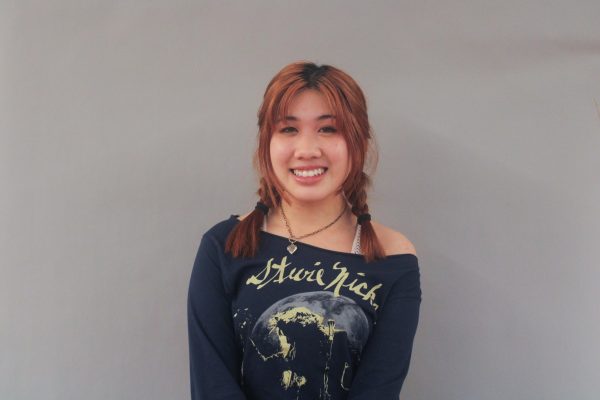
Danica is currently a senior. She enjoys reading, making art, and walking her dogs, and she will try any food once. She eats at least one fruit a day and has a disturbed circadian rhythm.
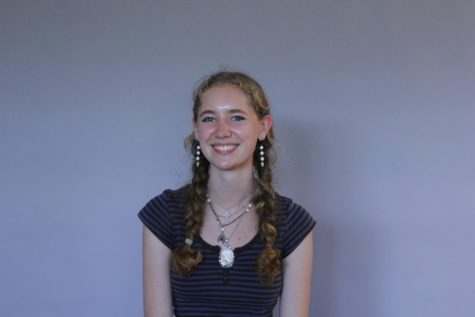
Marlena is a senior at Lowell. When she isn't at school she's probably at the lab, watching a movie, or sitting on the sidewalk listening to music (usually Björk).


